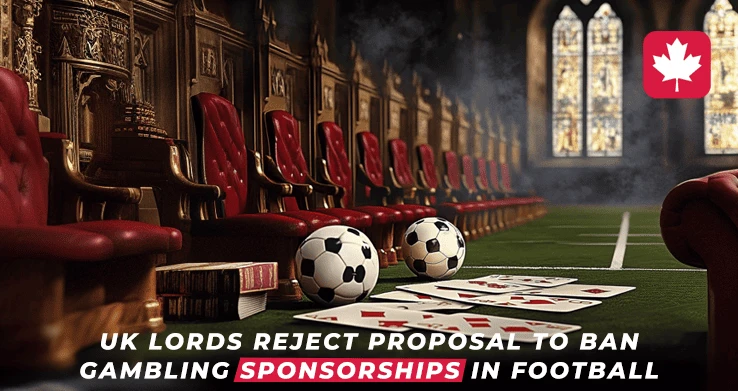Financial Interests Predominate: UK Lords Deny Proposal to Outlaw Gambling Sponsorships in Football
In a decisive move that underscores the power of financial influence in football, the UK House of Lords has rejected a proposal to ban gambling sponsorships within English football. The decision, made on March 17 during discussions on the Football Governance Bill, highlights how deeply entrenched gambling money has become in the sport.
The amendment, put forth by Liberal Democrat Lord Addington, aimed to eliminate all forms of gambling-related advertising and sponsorships in football. Addington argued that the overwhelming presence of betting ads in the sport had reached an unacceptable level, stating, “It has got ridiculous—we have to do something here.” However, despite growing concerns over gambling’s impact on fans and players, the proposal was overwhelmingly defeated by a vote of 339 to 74.
Financial Dependency Overrides Ethical Concerns
The rejection of the ban reveals the extent to which football clubs, especially smaller ones, rely on gambling sponsorships as a major revenue source. Opponents of the ban argued that cutting off these financial streams could push struggling clubs further into economic distress.
Baroness Fox of Buckley defended gambling sponsorships, stating that the amendment would deprive clubs of a “perfectly legitimate source of funding.” She also warned that imposing such restrictions could turn the independent football regulator into a politically charged entity, rather than a body focused purely on governance.
Echoing these sentiments, Lord Parkinson of Whitley Bay insisted that the proposal overstepped the bill’s original objectives. He suggested that a more balanced approach—one that didn’t involve outright prohibition—was necessary.
Government and Premier League’s Stance
Despite the failure of the proposed ban, efforts to curb gambling’s dominance in football have not been entirely dismissed. UK Minister for Gambling, Baroness Twycross, reaffirmed the government’s stance on ensuring advertising remains “proportionate and appropriate.” However, she stopped short of supporting direct intervention, instead calling for self-regulation within the industry.
The Premier League has already made some concessions, agreeing to remove gambling company logos from the front of team jerseys starting with the 2026-2027 season. Yet, this move does little to address the widespread advertising that remains deeply embedded in football culture.
Bill Moves to House of Commons
With the Football Governance Bill now heading to the House of Commons, further debate is expected. While the Lords have rejected an outright ban on gambling sponsorships, discussions around the regulation of gambling in football are far from over.
For now, the decision serves as a clear reminder: when financial interests are at stake, ethical considerations often take a backseat. Football clubs may continue to thrive on gambling sponsorships, but the cost to fans, particularly vulnerable individuals at risk of gambling harm, remains a pressing issue left unresolved.



JackiiePumpkin Well, the classic is that half of the gray bookmakers have such a scheme. The main thing is that they give money for sponsorship, and then at least the grass does not grow.



GodBJTTA Not exactly "when it wants". The provider releases a game with several RTP versions (e.g. 96%, 94%, 91%). And the casino, when it buys a slot for its site, chooses one of these versions. Therefore, in one casik, the slot can have a return of 96%, and in another – 91%. Always check the information about the slot before playing, this can usually be done by clicking on the "i" or "?" button inside the game itself.




YellowPikmin Yes, I remember the Avengers slot... I caught such drifts there. I still regret that I did not take a screenshot, now you can't prove it.











































This was a missed opportunity. Other industries have restrictions on harmful advertising, so why does gambling get a free pass in football?
At least the Premier League is removing gambling logos from jerseys in 2026. It’s a small step, but clearly, real change won’t happen anytime soon.
It’s funny how they claim to be tackling problem gambling while still allowing massive advertising deals. Hypocrisy at its finest!
If smaller clubs truly depend on gambling sponsorships to survive, maybe the problem isn’t the ads but how football finances are managed overall.
They say it’s about financial stability, but what about the fans? Gambling ads are everywhere, and young people are being exposed to it constantly.